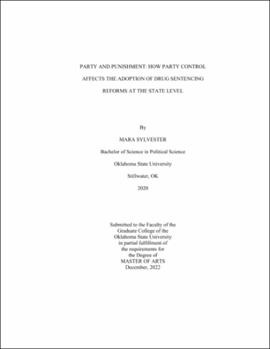| dc.contributor.advisor | Jansa, Joshua | |
| dc.contributor.author | Sylvester, Mara | |
| dc.date.accessioned | 2023-08-02T19:47:21Z | |
| dc.date.available | 2023-08-02T19:47:21Z | |
| dc.date.issued | 2022-12 | |
| dc.identifier.uri | https://hdl.handle.net/11244/338812 | |
| dc.description.abstract | How does state party control affect the adoption of drug sentencing reforms? Historically, both elected Democrats and Republicans have supported harsh sentencing policies and tough-on-crime policy attitudes. Recently, there has been a refocus and change in rhetoric regarding criminal justice policy by the Democratic and Republican National Committees. Using the theoretical framework of polarization and party control I argue that state governments with unified party control are more likely to act in accordance with their respective national parties. In doing so, I am able to move the conversation presented in previous literature from the national and judicial levels to the state level. I am also able to address and test the assumed behavior of the Democratic Party untested in previous literature. I posit that states with unified Republican control are less likely to adopt drug sentencing reforms and that states with unified Democratic Party control will be more likely to adopt drug sentencing reforms after 2008 when Democratic policy attitudes shifted from more punitive to rehabilitative. I collect panel data from all 50 states over the span of 30 years, from 1990-2020. Using two-way fixed effects, I find support for my hypotheses that unified party control affects the adoption of drug sentencing reforms in the directions I predict. | |
| dc.format | application/pdf | |
| dc.language | en_US | |
| dc.rights | Copyright is held by the author who has granted the Oklahoma State University Library the non-exclusive right to share this material in its institutional repository. Contact Digital Library Services at lib-dls@okstate.edu or 405-744-9161 for the permission policy on the use, reproduction or distribution of this material. | |
| dc.title | Party and punishment: How party control affects the adoption of drug sentencing reform at the state level | |
| dc.contributor.committeeMember | Herrick, Rebekah | |
| dc.contributor.committeeMember | Ringsmuth, Eve | |
| osu.filename | Sylvester_okstate_0664M_17959.pdf | |
| osu.accesstype | Open Access | |
| dc.type.genre | Thesis | |
| dc.type.material | Text | |
| dc.subject.keywords | drug sentencing reforms | |
| dc.subject.keywords | party control | |
| dc.subject.keywords | polarization | |
| dc.subject.keywords | sentencing reforms | |
| thesis.degree.discipline | Political Science | |
| thesis.degree.grantor | Oklahoma State University | |
